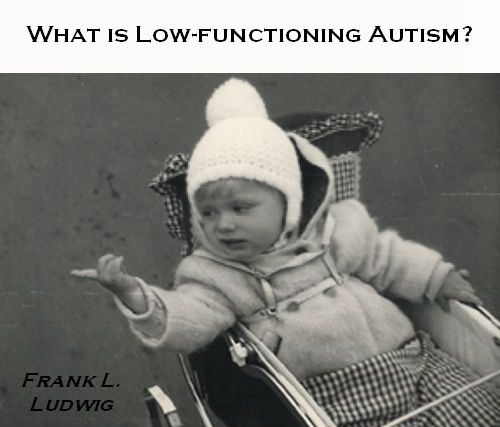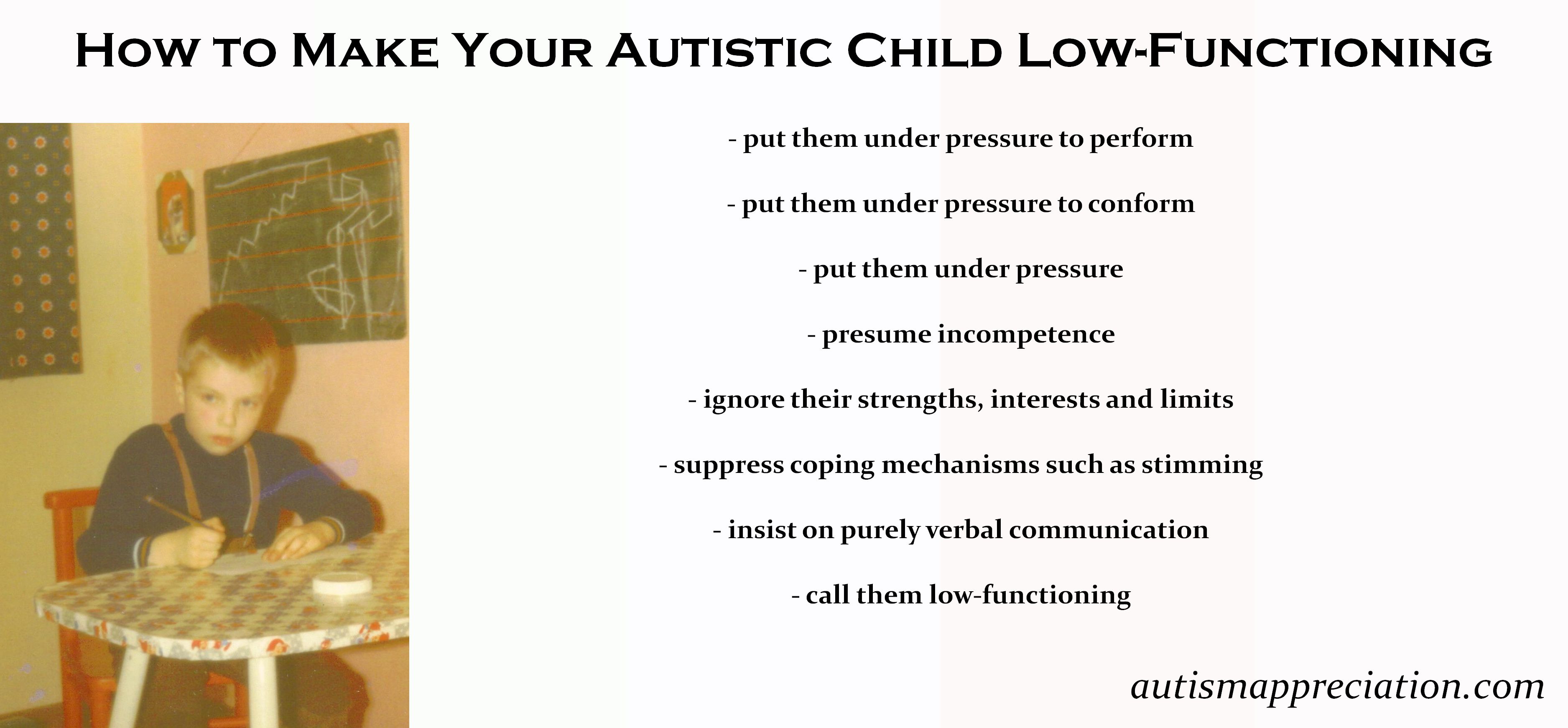
Read more on
|
Tweet
|
Low-functioning autism is a myth.
Autism is a neurological orientation which provides us with an individual nature as opposed to other people’s social nature. Therefore the term ‘low-functioning autism’ makes as much sense as the term ‘low-functioning left-handedness’.
There are three possible reasons for autistic individuals to appear low-functioning: actual disabilities (in which case autism can’t be blamed), pressure and discouragement. And while any kind of pressure has a paralysing effect on us, the pressure to suppress our individual identities and take on collective identities is by far the most detrimental, as I point out in this article.
Every autistic individual has potential, and our fate depends on whether this potential is recognised and nourished or buried under attempts to make us appear less autistic.
The labels ‘high-functioning’ and ‘low-functioning autism’ are both misleading and demeaning. The ‘high-functioning’ label dismisses our struggles, anxieties and frustrations in trying to adapt to a strange society and its rules while the ‘low-functioning’ label dismisses entirely the enormous potential of every autistic individual - and what you don’t look for, you won’t find. This point has been highlighted by a study in 2019. It is no surprise that the ‘severity’ of autism, i.e. the difference between ‘low- and high-functioning autism’, has been linked to the experienced stress levels in recent studies which indicates that the more we are put under pressure, the ‘lower-functioning’ we become. Furthermore, would you label a 3-year-old who doesn’t speak but solves a Rubik’s Cube in two minutes as high- or as low-functioning?
The greatest dangers autistic children face are being pressured and being written off. We develop at our own speed, and we thrive with encouragement as much as we break under pressure. And when non-autistic ‘specialists’, or even our own parents, give up on us and claim that we will never be able to speak, tie our laces, graduate from school etc, we have a tendency to trust their judgement and cease trying. A researcher observed that 'if you drop your expectation level for a child with autism, they will drop to that level.’ And researchers Martha R Leary and Anne M Donnellan commented, ‘In our field, assumptions about labeled people are so deeply rooted that we tend to think they are facts. They are not – they are only shared beliefs.’ (From their book Autism: Sensory-Movement Differences and Diversity.)
I’m sure you have heard of the cases of supposedly ‘low-functioning’ and ‘severely’ autistic children who surprised everybody with their abilities, often after finding alternative ways to communicate. In fact, there are so many cases that they can’t be considered exceptions anymore; on the contrary, they indicate that all autistic children have the potential to develop and thrive in a supportive environment in which their interests and talents are encouraged rather than one in which their autistic identities are suppressed and ‘corrected’.
Presuming competence is the key to both happy parenthood and a happy childhood.
If autism had been pathologised in his days already, even Albert Einstein would have been labelled as 'low-functioning'.
Study: Autistic children at risk of being underestimated
This is a list of some of the many children who were written off as low-functioning, and who proved everybody wrong:
Donald Gray Triplett: When he was a toddler, autism had not been defined yet. His odd and withdrawn behaviour as well as his developmental delays caused doctors to recommend his institutionalisation so his parents could forget about him and move on with their lives.
They followed this advice when Donald was not even four but kept visiting him regularly, and one year later his mother decided they’d take him home again. At the age of ten he became Case 1 when Leo Kanner diagnosed him with autism and gave him an unfavourable prognosis.
Donald went on to study, live independently and work as a bank teller. After retiring he became a popular and happy pensioner in his hometown of Forest, Mississippi, where he died at the age of 89.
Jacob Barnett: Jacob was diagnosed with ‘moderate to severe autism’ at the age of two, and his mother was told he would never learn more than the most basic skills. His language regressed at an early stage as he languished in a special education class.
By three and a half he had taught himself to read, and on a visit to a planetarium he regained his speech as he correctly answered a professor’s difficult questions addressed to his students.
His mother took him out of special education and all therapies and taught him herself, focussing on his strengths and interests. Jacob went on to study, skipping several years, received his master's degree at the age of 16 and is now working on his PhD. He has also been lecturing on the subjects of astrophysics and calculus since he was 12.
Boy genius diagnosed with autism has IQ higher than Einstein
Autistic Teen Working on Astrophysics PhD.
Autism to Astrophysics: Jacob Barnett
Jacob Barnett's Curious and Computational Mind
Tito Mukhopadhyay: Tito was diagnosed with ‘severe non-verbal autism’ at the age of three and a half. Told to keep her son busy, his mother developed the Rapid Prompting Method. Today Tito is a successful author and poet.
Wikipedia: Tito Mukhopadhyay
A Mother’s Courage
Emma Zurcher: Diagnosed at the age of two and having difficulties articulating herself, the prognoses for Emma were not favourable. Initially her mother was looking for ‘treatments’ and tried several unsuccessful therapies recommended by ‘experts’; however, over the years she started listening to autistic adults who introduced her to alternative means of communication. Subsequently she got in contact with Tito’s mother (see last entry) and, using the Rapid Prompting Method, enabled Emma to communicate using a stencil board and later a keyboard. Today Emma is a happy young girl attending several mainstream classes while being homeschooled. She is also a prolific writer and blogger.
Carly Fleischmann: Diagnosed at the age of two with autism, developmental delay and oral-motor apraxia, Carly’s parents were told she was ‘mentally retarded’ and would never develop past the stage of a six-year-old.
Unable to articulate herself verbally, she once typed ‘HURT HELP’ on her therapist’s laptop before getting sick when she was 10. From then on she learned to communicate by typing, turned out to have an IQ of 120, attended mainstream school and afterwards studied at the University of Toronto. Besides all this she became a prolific blogger and writer.
There was a setback when, at the age of nineteen, she was talked into an electroshock ‘therapy’ to deal with her ABA-induced OCD. As a result of the shocks she lost her ability to communicate for almost two years but has since posted on Facebook again. She also wrote the country song Glamour Girl.
However, she disappeared from social media in 2019 after revealing that she had been sexually assaulted by a friend of her father who dismissed her claim.
Carly’s Voice on Facebook
The Silenced Voice of Carly Fleischmann
Daryl Hannah: As a child Daryl was diagnosed with ‘borderline autism’, and her doctors strongly recommended medicating and institutionalising her.
Her mother refused and instead encouraged her fascination with the world of cinema.
Daryl became a Hollywood icon and is still a successful actress, as well as a political activist for several causes.
Daryl Hannah: "My battle with autism"
Tim Sharp: He was diagnosed at the age of three, and his mother was told to ‘put him away and forget about him’, which she didn’t. A ‘specialist’ predicted that he would never learn anything, not even to speak. When his mother tried to get him interested in drawing he picked it up immediately, and parallel to pursuing his new-found talent he also developed his speech. Today his drawings are sought after by collectors and displayed in exhibitions all over the world.
Wikipedia: Tim Sharp
Boy who found his voice
Dr Temple Grandin: She remained non-verbal until she was three and a half, but her parents refused to have her institutionalised as suggested by professionals. She found a mentor who encouraged her interests and talents, received a bachelor’s degree in psychology and masters and doctoral degrees in animal science and is now one of the world’s leading consultants on animal behaviour in the livestock industry.
(Grandin is problematic, though, since she only justifies the existence of 'high-functioning' autistic people, ignoring the fact that she started out as 'low-functioning' herself.)
Ido Kedar: Ido was diagnosed with ‘severe non-verbal autism’. At the age of seven he learned to communicate on a letter board, and later on a keyboard. Currently he is an honours student at high school as well as a published author.
Ido in Autismland
Autistic Teen Uses Tech to Break Silence: "I Escaped My Prison"
Ido Kedar’s Biography (Text Document)
John Hall: Diagnosed as ‘severely autistic’ and ‘slightly retarded’ as a child, John studied, earned an MBA and was awarded a doctorate. Today he is a CEO and published author with his own family.
Last but not least, in my autobiographical Growing Up Autistically I argue that, had I been diagnosed as a child, I would have been written off as 'low-functioning' myself, and today I probably wouldn't be the 'high-functioning' individual who, according to the logic of autismophobic parents, is not qualified to speak on behalf of their 'low-functioning' children.
The 'level' of autism depends on the amount of pressure put on us not to be ourselves and the degree of our resistance to that pressure.
MORE ON AUTISM


